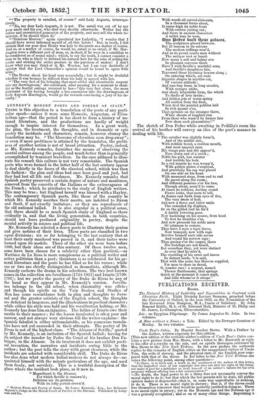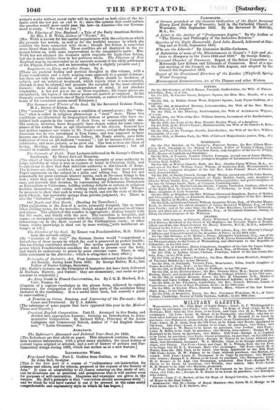PUBLICATIONS RECEIVED.
BOOM
The Natural History of Infidelity and Superstition in Contrast with Christian Faith. Eight Divinity Lecture Sermons, preached before the University of Oxford, in the year 1852, on the Foundation of the late Reverend, John Bampton, M.A., Canon of Salisbury. By John Esmond Biddle, M.A. of St. Edmund Hall, Minister of St. Philip and St. James, Leckhampton, Gloucestershire.
Isis : an Egyptian Pilgrimage. By James Augustus St. John. In two volumes.
A Kan without a Name ; a Tale. Edited by the Dowager Countess of Morley. In two volumes.
Uncle Tom's Cabin. By Harriet Beecher Stowe. With a Preface by the Author, written expressly for this edition. [This new edition of the veritable author's edition of Uncle Tom's Cabin con- tains a new preface from Mrs. Stowe, with a letter to Mr. Bosworth in reply to his offer of a royalty on the sale, and an epistle thereupon addressed by Mrs. Stowe to the New York Tribune. In the new preface the authoress replies to the remarks of English critics on the exaggerated virtues of Uncle Tom, the evils of slavery, and the physical state of the English poor com- pared with that of the slaves. In her letter to the New York Tribune she raises the following point, among other questions- " Is there, or is there not, a truth in the sentiment of the author of this letter, that the imperfect state of our copyright law does not alter the right of the thing, nor make it just for a publisher to avail himself of an author's talents for his own purposes without offenne him a fair remuneration ?" —No doubt, the legal power to do a thing does not necessarily convey the moral right to do it; but that which the law permits will be done, till public opinion makes it disgraceful—that is, in some way unprofitable or noxious, to do it. There is no moral right in slavery; that is, if the slaves could free themselves tomorrow they would be perfectly justified in doing so. There is no moral right in piracy;. yet in the Homeric age and the Norman age it was a princely _occupation ; and so on of many other things. Reprinting a
writer's works without mord right will be practised on both sides of the At- lantic until the law put an end to it ; since the opinion that could enforce the practice would more easily pass the law—in America—for our Govern- ment is ready. " We wait for you."] The Pilgrims of New England; a Tale of the Early American Settlers. By Mrs. J. B. Webb, Author of "Naomi," &c.
[Mrs. Webb is known for her careful acquaintance with the subjects on which she grounds her novels, as well as for the truthful manner in which she exhibits the facts connected with them ; though her fiction is somewhat more literal than is desirable. These qualities are all displayed in the ro- mance before us, with some improvement m the imaginative parts : Mrs. Webb has not attained the dramatic spirit requisite for high-class fiction, but she is more lifelike than in her previous works. The Pilgrims of New England may be recommended as an accurate account of the early settlement of the Pilgrim Fathers, and an interesting tale of a slightly juvenile cast.]
Empedocles on Etna, and other Poems. By A.
[There are poetical feeling and poetical thoughts in this volume, with a fluent versification and a style making some approach to a quaint richness : but these are only the externals of poetry. There should be freshness of subject, and an artistical treatment, which rejects what is non-essential, (though it may be related,) and presents the essential in the most effective manner: there should also be independence of mind, if not absolute originality. A. has not got so far as these requisites; his larger pieces aro encumbered, the topics of his shorter poems are narrow or common. In his dramatic scenes he reminds one of Barry Cornwall, or rather of his followers ; many of his occasional poems recall Tennyson.]
The Summer and Winter of the Soul. By the Reverend Erskine Neale, M.A., Rector of Sidon, &e. [The " summer " of the title means a condition of assured grace ; the "win- ter," what is called in religious phraseology a " dead" state. These two conditions are illustrated by biographical notices of persons who have ex- hibited both aspects in the course of their lives, or occasionally only one. The notices, however, have frequently been chosen rather for some conve- nience of the author than as apt illustrations of his objects. General Lee had neither summer nor winter in Mr. Neale's sense, except that during the American war he was introduced to Tom Paine, and was supposed to have become one of his disciples. Francis Jeffrey, Mr. Neale admits, gave little indication of even an All-hallown "summer" ; but he became kinder, more submissive, and more patient, as he grew old. The best notices are those of Irving, Sterling, and Buchanan the East Indian missionary ; but all abound in readable anecdote.] The Grounds of Faith. Four Lectures delivered in St. George's Church, Southwark. By Henry Edward Manning. [The object of these lectures is to enforce the necessity of some authority to judge infallibly of what is true in matters of belief in Christian faith, and to endeavour to show that that infallible authority is the Church of Rome. The lectures are clear, confident, and specious ; putting the most popular Papal arguments on the subject in a plain and telling way. They are not remarkable for great extrinsic literary merits, such as Newman brings to his task ; while they are full of fallacies. Mr. Manning alludes to the Gorham case, and perverts that decision, lty representing all Trinitarian Protestants as Rationalists or Unitarians, holding nothing definite or certain in religious doctrine themselves, and caring nothing what other people hold. Whence he proceeds to show that such is wrong in itself, and not the state of the Ro- mish Church, but inevitably springs from private judgment, &c. There is also the "historical" argument.] Old Roads and New Roads. (Reading for Travellers.)
[This publication is the first of a series, primarily designed, like so many other shilling series, for the traveller, though adapted for perusal in all times and places. The subject of this number is appropriate ; dealing largely with the old roads, and briefly with the new. -The execution is irregular, and argues an incomplete acquaintance with the subject. Sometimes the book is interesting—as in the short account of the Carthaginian roads ; at other times, scanty knowledge is eked out by mere writing,•with indifferent at- tempts at wit.]
The Dietetics of the Soul. By Ernest von Feuchtersleben, M.D. Edited from the seventh edition.
[By "dietetics of the soul," the German Doctor would "comprehend a knowledge of those means by which the soul is preserved in perfect health; this knowledge constitutes morality." One modus operandi seems to be a power which Feuchtersleben considers the mind to possess over the body, and which he endeavours to prove by some extreme cases. There is very little nutriment in the Dietetics; which is altogether a hazy affair.] Principles of Imitative Art. Four Lectures delivered before the Oxford Art Society, during Lent Term 1852. By George Butler, M.A., late Fellow of Exeter College, Secretary. [Mr. Butler's lectures on the Principles of Imitative Art have been delivered at Durham, Harrow, and Oxford: they are elementary, and make no pre- tensions to originality.]
An Easy Guide to French amversalion, &c. By J. G.E. Macleod, B.A. Univ. France, &c. [Consists of a copious vocabulary in the phrase form, followed by copious sentences; the conjugation of verbs and other parts of the accidence being included in the vocabulary. It is a useful little book, but scarcely a guide to conversation.] 4 Treatise on Corns, Bunions, and Ingrowing of the Toe-nail; their Cause and Treatment. By T. J. Ashton.
The substance of some papers that have appeared this year in the Medical ilium and Gazette.]
Practical English Composition. Part H. Arranged in five Books, and divided into appropriate Lessons; forming an Introduction to Argu- mentative Composition. By Richard Riley, Principal of the Leeds Collegiate and Commercial School, Author of "An English Gram- mar,' " Latin Grammar," 8c.e.
ALMANACY.
The Reformer's Almanack and Political Year-Book for 1863. [The Reformers are first afield on paper. This almanack contains the com- mon business information, with a great many statistics, the usual notices of current topics original or selected, and a sort of history of politics and Par- liamentary doings during 1852, which last strikes us as a new feature.] ILLVSTRATED WOBX.
Free-hand Outline. Part I. Outline from Outline, or from the Flat. By John Bell, Sculptor. [This is the first part of a course of " rudimentary art-instruction for artisans and others, and for schools, prepared at the request of the Society of Arta." It auns at adaptability to all classes entering on the study of art; and its directions are so practical and perspicuous that it will answer even for purposes of self-instruction. Diagrams and examples are given in the margin. Mr. Bell's principle is that "conviction should accompany study "; and we think he will have carried it out if he proceed in the same easily comprehensible and explanatory style in which he has begun.]
Paieeirurre.
A Sermon preached at the General Ordination of the Right Reverend Henry Lord Bishop of Worcester, held in the Cathedral Church of Worcester, 19th September 1852. By the Reverend D. Melville, M.A., &e.
A Letter to the Author of "Prolegomena Logics." By the Author of "The History and Philosophy of the Inductive Sciences."
Speeches of the Right Honourable Lord John Russell, delivered at Stir- ling and at Perth, September 1852.
Who are the Liberals? By Alexander Baillie-Cochrane.
A Refutation of some of the Misstatements in Giirgei's "Life and Ac- tions in Hungary in the Years 1848 and 1849." By George Kmety.
Liverpool Chamber of Commerce. Report of the Select Committee on Mercantile Law Reform and Tribunals of Commerce. Read at a spe- cial meeting of the Council on the 16th August, and adopted by the Council 6th September 1852.
Report of the Provisional Directors of the London (Watford) Spring Water Company.
Microscopical Examinations, tee. of the Thames and other Waters.



























 Previous page
Previous page